Browse Topics
Categories
Format
Multimedia
Speakers Series

Sino-Maghreb Relations: Past, Present, and Future
Over the past years, China has been increasing its presence and engagement with the Arab world. Presenting itself as a more reliable partner than the US and Europe, Chinese officials have been working diligently to further develop political ties with various Arab capitals, as well as expand commercial opportunities. North Africa has been another key […]
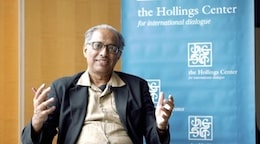
Planning Megacities
Kazi K. Ashraf discusses how a megacity could be defined and the challenges that definition will create for urbanists in planning for megacities. Kazi K. Ashraf is an architect, urbanist and architectural historian. He received his master’s from MIT and a PhD from the University of Pennsylvania. Currently director-general of Bengal Institute for Architecture, Landscapes […]
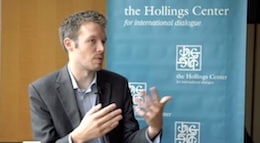
Balancing Preservation with Growth in Megacities
Alex Armlovich discusses the issues surrounding growth and preservation in megacities. He outlines good examples of preserving culture, history, and environment, while dealing with the challenges posed by a megacities needs for growth and development. He further outlines the impact of gentrification on megacities. Alex Armlovich is a fellow in state and local policy at […]

Technology and Megacities
Nina Purwajati and Biondo Sanda Sima give examples of how Indonesia and other countries are using technology to address the challenges of megacities. They later discus the urbanization trends in Indonesia and their potential impact. Nini Purwajati is a senior program manager with 100 Resilient Cities – pioneered by the Rockefeller Foundation (100RC) Asia Pacific […]
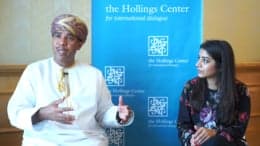
Economic Diversification in Oman
Like other GCC states, Oman is working to diversify its economy and is engaged in a plan to achieve this goal. Khalid Alharibi and Fatma Abduljalil Moosa discuss Oman’s progress toward this goal. They further discuss how small and medium sized enterprises (SMEs) will play a role in Oman’s economic future. Khalid Alharibi is the […]
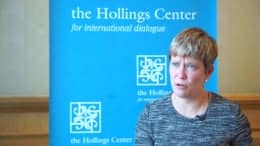
Implications of American-produced Oil and Gas on the GCC Economies
The increase in American capacity for oil and gas production in recent years has positioned the United States to become a net exporter of these resources by 2020. This has the potential for significant geopolitical implications, particularly for GCC economies as they work to diversify their economies away from the energy sector. Samantha Gross discusses […]
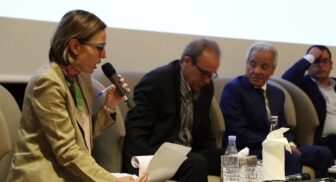
Political Pluralism in Tunisia: Reconciling Deep Reforms with Stability
On October 9, 2018, the Hollings Center for International Dialogue, in cooperation with partners Solidar Tunisia and the Jasmine Foundation, hosted a regional report launch for its Political Pluralism in the Middle East and North Africa initiative. The following video features the keynote address and highlights of the first panel that morning. Participants include: Moderator: […]
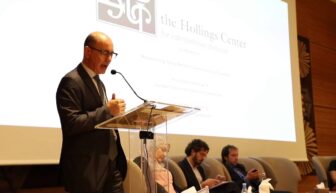
Prospects for Political Pluralism in the Middle East and North Africa
On October 9, 2018, the Hollings Center for International Dialogue, in cooperation with partners Solidar Tunisia and the Jasmine Foundation, hosted a regional report launch for its Political Pluralism in the Middle East and North Africa initiative. The following video features the keynote address and highlights of the first panel that morning. Participants include: Keynote […]
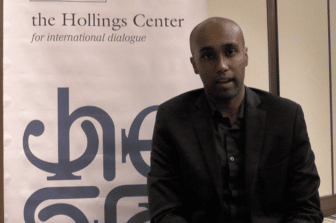
Prashanth Parameswaran on U.S. Policy towards the Association of Southeast Asian Nations (ASEAN)
Prashanth Parameswaran discusses what the United States needs to do in order to engage Southeast Asia collectively. He further discusses the role for U.S. security architecture in the region under the new administration. Prashanth Parameswaran is senior editor at The Diplomat based in Washington, D.C., where he writes mostly on Southeast Asia, Asian security affairs […]
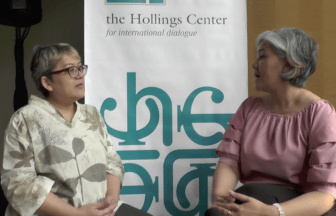
Desi Indrimayutri & Tina Jamaluddin on U.S.-ASEAN Economic Relations
Desi Indrimayutri & Tina Jamaluddin discuss why the ASEAN region is important to the private sector and U.S. investment success stories. Desi Indrimayutri is the US-ASEAN Business Council’s managing representative in Indonesia and its senior liaison with the Indonesian Government, the ASEAN Secretariat, the U.S. diplomatic presence in Indonesia and other key high-level stakeholders. The […]
A non-profit, non-governmental organization dedicated to fostering dialogue between the United States and countries with predominantly Muslim populations in the Middle East, North Africa, South Asia, Eurasia and Europe
Stay Informed
Subscribe to our mailing list to stay up to date on our latest information.